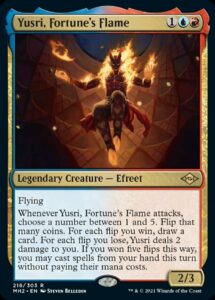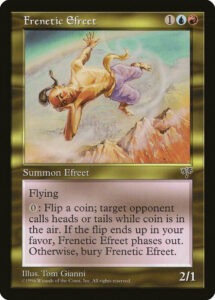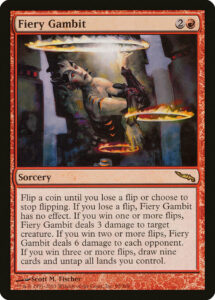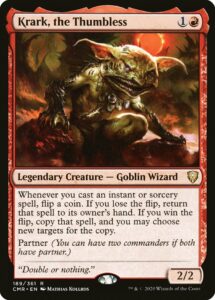Push your luck is a staple mechanic for games. Most decisions have some balance of risk versus reward, but sometimes game designers present you with the explicit ability to court randomness. You’re not crafting a situation where if you draw the right card at the right time, you claim victory from the jaws of defeat. No, you’re making an educated guess about whether to roll the dice and your input ends when they leave your fingers.
Magic has had cards with output randomness since its beginning, but Modern Horizons 2 introduces one of the cooler ones I’ve ever seen.
The numbers on Yusri, Fortune’s Flame are pretty perfect. As a 2/3 flying for three, it’s good enough to play in noncompetitive formats but too slow and fragile for Modern—competitive formats tend to do better when top tier cards don’t reduce game states to literal coin flips. But those stats are merely the canvas upon which the real meat of the card lives: the allure of drawing cards.
In general, card draw associated with pain is a black ability. It tends to cost 1 life per card, but repeatable outlets like Greed and Arguel’s Blood Fast cost 2. There’s also the unique and out-of-color-pie Sylvan Library, which costs 4 life per card but provides perfect information about what you’ll draw. Yusri hews to the Greed rate, except as a chaotic blue-red Efreet, promises either a painless draw or pointless pain rather than reliability.
On average, Yusri offers an incredible deal—2.5 cards per turn at the cost of 5 life. This deal is further sweetened in that 3% of the time, you get a one-turn Omniscience. Sure, you could be safer and only choose 2, but you’ll feel lousy 25% of the time when you get nothing and you’ll never hit the 3% Omniscience by playing it safe. By going for all 5, you have a 97% chance of getting at least one card, so you might as well go for broke as often as possible.
Yusri stacking the odds in your favor is beautiful. The fact that Magic’s game system quietly punishes you for playing the odds makes the design brilliant. In head-to-head Magic, you obviously don’t have much life to work with and are liable to lose before being able to use everything Yusri draws you. But in all formats, if you draw 4 additional cards on turn 4, you’re also liable to discard down to hand size, minimizing Yusri’s boon—unless of course you go 5 for 5 and cast them all for free. It’s a fantastic use of a meaningful bingo that directly synergizes with the card’s effect.
Yusri’s randomness is much more balanced than most prior coin flipping cards. Fiery Gambit is too random for my liking, seemingly designed to be abused with Krark’s Thumb rather than played fairly. And getting absolutely nothing from an entire card feels personally less satisfying than being punished—Yusri always provides something when you alter the game state, and one bad flip is more than worth one good flip.
Ral Zarek‘s ultimate seems like a close analogue to Yusri, but Ral offers no actual choice—you have to flip five coins and there’s no reason not to flip the coins or not ultimate (unless you’ve got a Time Vault in play). And like Fiery Gambit, Ral either gives you a gift or nothing. That’s fine for a Planeswalker ultimate not intended for heavy Constructed play and the kind of thing that’ll lead to good stories, which overt variance cards often do. But the massive effect of winning even a single coin flip makes the experience more defined by the 3% case where you lose all five flips. It doesn’t really matter much whether you’re taking two extra turns or four.
Yusri works so well because each individual reward is good (but not incredible), each failed flip is painful (but hardly debilitating), and each result changes the game state. The effects are small enough that each flip matters, unlike with Ral Zarek, and the card is forgiving enough that you want to keep pushing your luck, unlike with Fiery Gambit.
I’ve generally not been part of the coin flipping demographic. I’ve never longed to decide a game via Amulet of Quoz or enjoying playing with or against Sorceror’s Strongbox. Yet recent designs like Yusri and Krark, the Thumbless temper my aversion. Part of this is indeed due to them being aggressively costed, but there’s more to them than acceptable states as a fail case. They both manage to offer beneficial deals on average that are liable to swing the game in either direction without the utterly ludicrous effects that Fiery Gambit needs to function. They work in different ways (Krark being a literal game of double or nothing and Yusri giving you a controllable casino game), but both get at the heart of deeply human experiences—the need for hope, for great stories, and to feel triumphant. They let you claim ownership over success because you decided to roll the dice while simultaneously letting you blame them for failure.
Magic is a game made for many different audiences. As players, we benefit from the recognition that some cards, perhaps most cards, aren’t made with us in mind. That’s not an indictment of Magic but a boon to us all that so many people love and support the game. It’s better to enjoy Magic by focusing on the parts one loves rather than disdaining cards which least hold one’s interest (and public disparagement can hurt or discourage the people such cards are meant for). But it’s also good to be reminded that there are no blanket rules—I am not a Variance Timmy, but I must admit there are now a couple coin flipping cards I can’t wait to cube with. Moments like this remind me to be more open-minded, since you never know which new experiences will buck past trends. I’ll try to keep that in mind the next time I play against Tron.
And, as always, thanks for reading.
Zachary Barash is a New York City-based game designer and the commissioner of Team Draft League. He designs for Kingdom Death: Monster, has a Game Design MFA from the NYU Game Center, and does freelance game design. When the stars align, he streams Magic (but the stars align way less often than he’d like).





